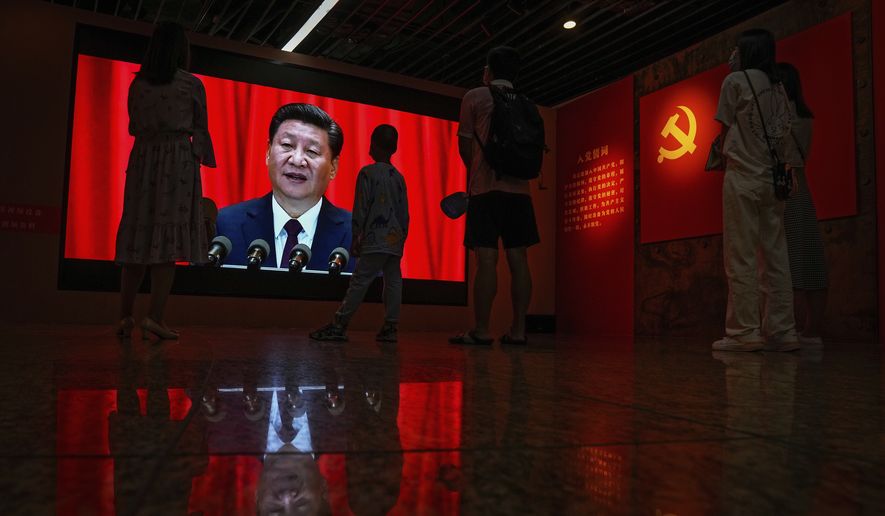Rumors about the defection of a high-ranking Chinese intelligence official to the United States circulated recently at the same time that the ruling Chinese Communist Party staged an unusual loyalty campaign to bolster ideological purity within the ranks of the 93 million-member ruling party.
The loyalty drive was highlighted by a recent CCP oath-taking led by President Xi Jinping and a statement from the party’s Central Commission for Discipline Inspection invoking the damage done by the 1931 defection of a senior communist official.
The drive came as after unconfirmed U.S. news reports last week that Dong Jingwei, vice minister at the Ministry of State Security (MSS), the civilian spy agency, had fled the country in February and was under the protection of the Defense Intelligence Agency. The reports triggered widespread responses on social media and in anti-communist Chinese news outlets, although no proof of the defection was provided.
Several days after those reports, Chinese state media, in an apparent response, published a report noting Mr. Dong had spoken at a conference. But no photo of the speech was provided, fueling further speculation. The report from the Ministry of State Security said Mr. Dong hosted a conference on the study and implementation of “anti-spy” security measures.
As further rumors swirled, China on Wednesday published on the social media site of the Ministry of Public Security, a companion security and intelligence service to the MSS, the first photo of Mr. Dong seated at a meeting this week of the Shanghai Cooperation Organization (SCO). The photo and story pointedly stated that “Dong Jingwei, deputy minister of state security, attended the meeting.”
A U.S. official familiar with intelligence reports said the reported defection is false.
Two other government sources said they do not believe Mr. Dong defected, but declined to say whether U.S. intelligence agencies may have a high-level defector from one of the Chinese spy services.
Former National Security Agency counterspy John Schindler said he believes the spate of defection rumors were part of a Chinese disinformation effort to distract attention from growing international concern over reports the coronavirus pandemic may have originated in a Wuhan laboratory.
“If Dong didn’t defect to the United States, if that’s just a lie, this is a fine provocation to make a bunch of Americans look like gullible fools — not to mention that it raises considerable doubts about the coronavirus ‘lab leak’ hypothesis, which has gained so much media traction in the West in recent weeks,” Mr. Schindler wrote in a recent article published in the newsletter “Top Secret Umbra.”
Asked about Mr. Dong’s reported defection, a Chinese Embassy spokesman provided links to online text and video reports showing Mr. Dong attending the SCO meeting. The photos published by the Chinese government showed one image “in which Mr. Dong sits on the furthest right,” the spokesman said.
The shooting down of the story by both Chinese and U.S. officials highlights the sensitive nature of the defection issue.
The Washington Times reported in September that a senior PLA officer had defected to a European country and provided information on China’s covert biological weapons program. The defector, who has not been identified, is said to be under the protection of a European spy service over concerns that U.S. intelligence agencies are not sufficiently secure.
The U.S. government mishandled the defection of a senior Chinese official in 2012. CCP official Wang Lijun went to the U.S. consulate in Chengdu with documents and attempted to defect in the midst of a major power struggle between Beijing leaders and regional Communist Party leader Bo Xilai.
Then-Secretary of State Hillary Clinton, in her memoir “Hard Choices,” defended the decision to turn the defector over to Chinese authorities rather than try to spirit him out of the country. Mrs. Clinton said the defector was returned to avoid embarrassing China’s leaders.
The latest defection rumors coincided with a high-profile ceremony in Beijing on Tuesday in which President Xi joined all 25 members of the ruling Politburo in taking a loyalty oath. The officials included secretariat officials, state counselors, the president of China’s supreme court and members of the Central Military Commission and National People’s Congress. The renewed ideological fervor is timed to the upcoming 100-year anniversary of the founding of China’s Communist Party.
The oath is required for all new members of the party and the June 18 ceremony at the History Exhibition Hall in Beijing was heavily featured on state media. Prior to reciting the oath, Mr. Xi called on the leaders to adhere to party ideology, politics and action with a “high degree of consistency.”
The oath calls on party members to strictly follow party decisions and guard party secrets. Party members vow in the oath to “fight for communism throughout my life, be ready at all times to sacrifice my all for the party and the people and never betray the party.”
A day after the oath ceremony, the Central Commission for Discipline Inspection, which enforces Marxism-Leninism in the party, issued a statement on the defection 90 years ago of Gu Shunzhang, who defected in April 1931 when he was an alternate Politburo member in charge of security for the Party’s central committee.
Gu, a deputy to longtime party leader Zhou Enlai, exposed one of the Communist Party’s most successful spy penetration operations – the planting of CCP agents within the rival Nationalist Kuomintang (KMT) Party. Gu had been working as a spy inside the KMT and, when uncovered, defected and revealed large-scale spy penetrations.
Following the Soviet example, Zhou Enlai ordered all Gu’s 10 relatives executed.
The Gu defection, according to historical accounts, forced a major overhaul of the CCP spy apparatus and triggered a brutal internal struggle labeled as “traitor elimination.”
• Bill Gertz can be reached at bgertz@washingtontimes.com.




Please read our comment policy before commenting.